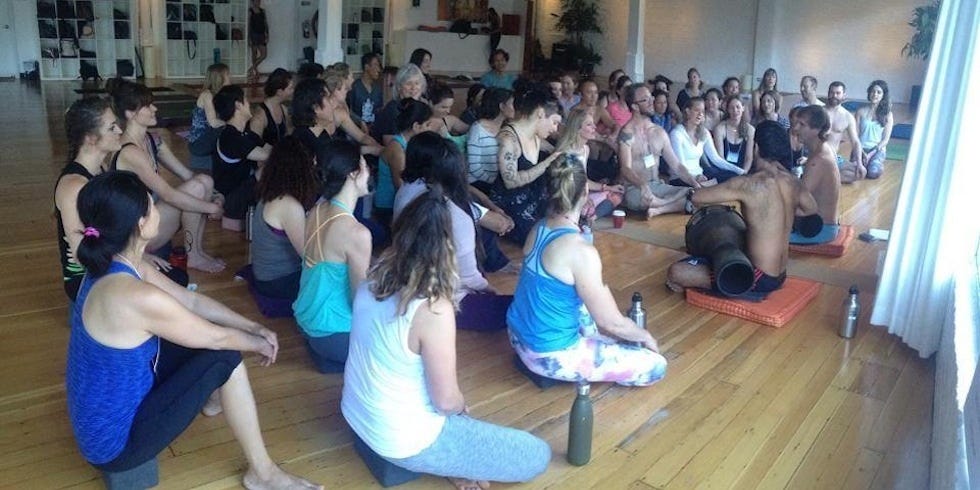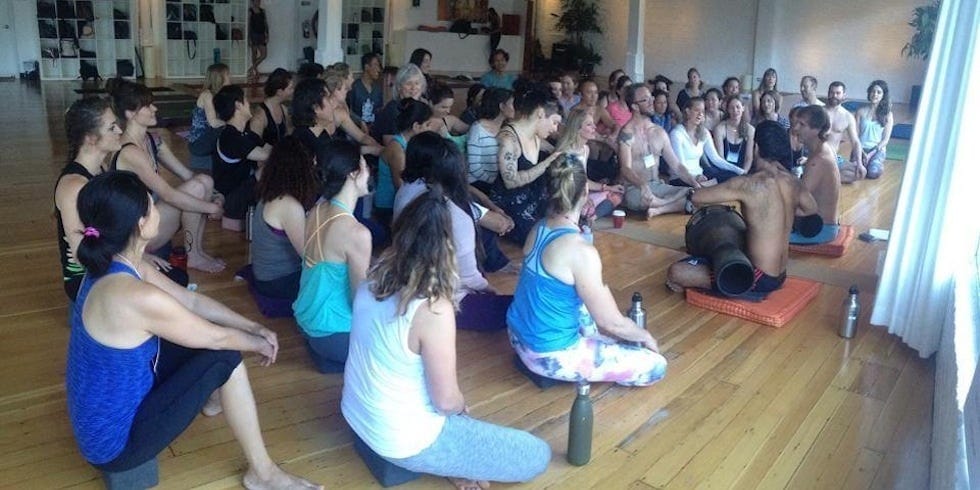By Rachel Balik

“What about right now? Are you happy?” That’s a question Rusty Wells once asked a room of sweaty yoga students, packed liked sardines into the loft-like space at the studio he founded and owns, Urban Flow. Despite being halfway through a grueling, almost two-hour yoga class, I heard many practitioners cheering, “Yes!”
Wells, who’s had a cult-like following for many years, calls himself a “Yogic Messenger” and teaches students to substitute unconditional love for fear through Bhakti Flow, a practice that often feels more like a festival or church service than a yoga class. Students talk about getting addicted to his class, where they might cry, laugh, or find catharsis.
“Rusty has this magic power of being able to look at you and make you feel like the most special and loved person on the planet,” explained Erin Gilmore, a full-time yoga teacher who trained there. His energy is so unflappably positive that he didn’t even miss a blissed-out beat when announcing that Urban Flow is shutting its Mission Street doors on November 30 and is looking for a new home. As he wrote on the studio’s Facebook page:
“The physical center we have called Urban Flow will close its current physical location on November 30. It is time for something different. The practice will continue in a different shape and, rest assured, I will send updates soon. Right now, December will be a month of rediscovery for us and my goal is to have everything in place for you to rejoin us on the mat by January 1. In the meantime, I ask that you please visit us every single day in November and savor these very special last experiences here. It is so beautiful here. Come … get even closer. I dare you! This is a time of celebration and unabashed joy.”
Although one could certainly argue that there’s no shortage of yoga in San Francisco, closing studios is sad news for owners, yoga teachers, and of course, students. Yoga has been criticized in the past as an elitist sport, but studios like Urban Flow break that mold by offering quality teachers without a crazy price tag.
He doesn’t give a reason for this change, and when reached out to by The Bold Italic he declined to comment, but the yoga teacher rumor mill reports that Urban Flow’s lease ended and the landlord wanted to “double or triple” their rent. To devoted students, this feels particularly unjust given that the studio, a spacious, lightly decorated room with hardwood floors, ample natural light, and a killer sound system, was just entirely rebuilt after being destroyed by a flood in the building. But financial challenges have been mounting over time. In the past year, Urban Flow stopped being donation-based and began charging $15 per class.
Students could gain access to topnotch teachers like Stephanie Synder and Jason Crandell without suffering the typically steep class fee, but it didn’t alleviate pressure on the studio. While a class at Yoga Tree (which costs $18 a pop) draws 20–40 students on average, San Francisco’s donation-based studios like Urban Flow and Yoga to the People (on 16th and Mission) can pack over 100 students into a class — and they need to, if they want to make a profit.
Urban Flow boasts a robust community of devoted students. It offers free yoga for beginners once a week and advanced training and workshops for serious practitioners. The classes, which include music, chanting, philosophy, and movement, have a profoundly distinct flavor, even in a city inundated with yoga.
“The vibe could get electric,” recalls Sara Schwartz, a yoga teacher and former student. However, that vibe wasn’t for everybody, and while some of the bigger studios are able to reach a broader audience by offering different types of classes, Urban Flow was solely focused on teaching Wells’ trademarked Bhakti Flow. The philosophy was too much for some (I personally used to resent being told to “listen to your heart talk”) but is transformational for others. It even shows up in the studio’s attitude towards temporarily shutting its doors.
At a time when many people in San Francisco are reacting the closing of restaurants and bars with outrage and fear-mongering, those sentiments are entirely absent from Urban Flow’s announcement. Even in a city where rents are prohibitively high, Wells sounds optimistic about finding a new space in a way that only a really serious yoga teacher, er Yogic Messenger, could be.
But whether cultivating “unabashed joy” is actually a sound strategy for running a yoga business in San Francisco remains to be seen, especially since Urban Flow isn’t the only studio coming upon hard times. A few small studios have closed shop due to high rents recently, the latest being International Orange, a spa in the Filmore-Jackson neighborhood that used to offer yoga classes. The studio hosted a closing party this past Sunday and will strive for higher revenue by expanding its spa business and offering only private classes, which are more lucrative.
Although one could certainly argue that there’s no shortage of yoga in San Francisco, closing studios even temporarily is sad news for owners, yoga teachers, and of course, students. Yoga has been criticized in the past as an elitist sport, but studios like Urban Flow break that mold by offering quality teachers without a crazy price tag. It’s one of the institutions that made San Francisco a great place to live no matter what your income. It will be interesting to see where the studio lands in January and how it weathers the city’s changing economic tide.
Got a tip for The Bold Italic? Email tips@thebolditalic.com.
Image from Urban Flow/Facebook







